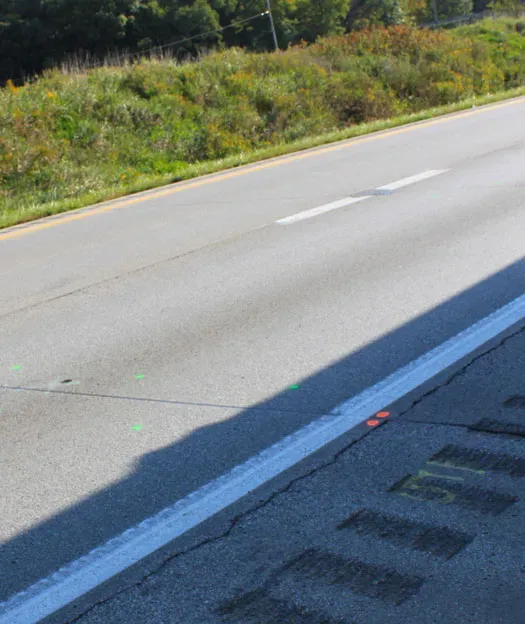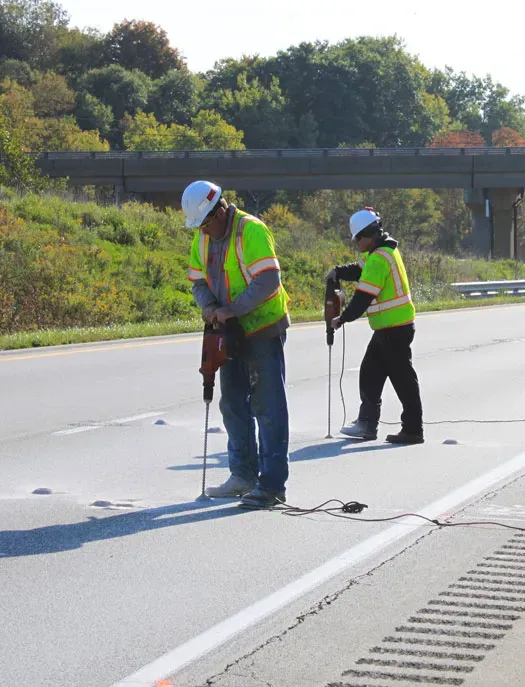Composite Pavement Joint Repair in Pennsylvania
Problem
URETEK and the Pennsylvania Department of Transportation (PennDOT) developed and executed a cooperative pilot project to assess the improvement of transverse joint performance in composite pavements following injection of high-density polyurethane. PennDOT planned to use the findings of the study to make decisions about the viability of future, larger-scale repair projects using polyurethane injections. PennDOT chose a section of interstate highway I-80 in Mercer County that became the test site for the project.
Analysis
The pavement profile at the test site from the surface-down consisted of the following layers: 3.5-inch asphaltic concrete, 13-inch Portland cement concrete, 4-inch open graded subbase, 8-inch A-2 subbase, and mixed material subgrade. At the start of the project, PennDOT reported excess water in the subgrade layer and curling due to loss of fines at the joints. PennDOT performed initial, pre-injection Falling Weight Deflectometer (FWD) testing at the test site to use as a baseline data set of load transfer efficiencies (LTEs) of the joints.
Solution
URETEK injected polyurethane into the foundation soils of the pavement system using a specialized application of the URETEK Deep Injection® (UDI) process known as Joint Vicinity Injection (JVI). URETEK performed JVI on seven successive transverse joints in an eastbound travel lane segment of the I-80 test site. PennDOT performed post-injection FWD testing 24 hours after JVI completion to assess void reduction and improvement in LTEs of the joints.
Result
PennDOT compared the pre-injection and post-injection FWD test results on a sampling of the joints at the I-80 test site. Comparative analysis revealed that URETEK’s JVI process significantly reduced the size of voids in the vicinity of the joints and dramatically improved the LTEs for the transverse joints. This small-scale pilot study provided irrefutable evidence to support deploying URETEK’s JVI process in transverse joint improvement jobs. With this data in hand, PennDOT can confidently employ URETEK in future larger-scale projects.
URETEK Deep Injection® (UDI)
Widely referenced throughout our industry, UDI involves the injection of structural polymer into base and subgrade soils to increase the load bearing capacity. This is achieved by injecting the polymer through small holes drilled directly through the pavement structure to depths determined by site-specific analysis. Our URETEK 486 Star® material flows easily into voids and weak zones within the soil mass below. Through a controlled chemical reaction, the expanding polymer compacts surrounding soils and applies a controlled pressure on targeted areas of the affected pavement above. If needed, a multi-injection design plan is utilized to gently return the pavement to its original grade. The composite material quickly cures into a strong, dimensionally stable, and water-resistant geo-material, providing years of reliable service.
URETEK 486 Star®
URETEK 486 Star® polymer is a two-component, high-density, expanding thermoset polyurethane system. It was developed to be the ideal solution for under-sealing, void filling, lifting of settled pavement, stabilization and stiffening of weak soils, and for encapsulating and sealing buried infrastructure. URETEK 486 Star® is environmentally inert, non-toxic, and resists underground water erosion or weakening due to its industry-leading hydrophobic properties.

